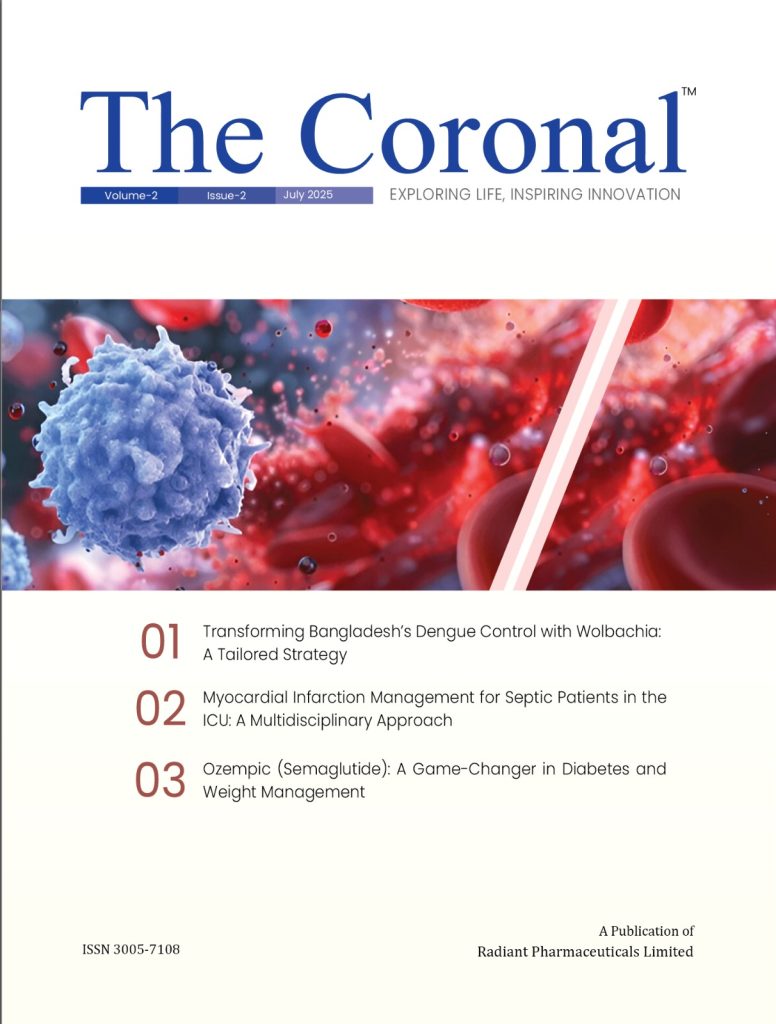
In global health, the most urgent threats are rarely confined to a single disease or specialty. Polycystic Ovary Syndrome (PCOS), for example, has long been seen as a reproductive disorder, yet mounting evidence shows it is a complex endocrine condition with serious metabolic consequences. The challenge of managing sepsis, which claims about 11 million lives annually—roughly one-fifth of all global deaths. When it overlaps with ST-elevation myocardial infarction (STEMI), outcomes worsen dramatically. Bangladesh’s battle with dengue fever, once seasonal, has now become a year-round crisis, escalating this epidemic to a new dimension. The 2023 outbreak, the deadliest on record, brought over 321,000 cases and 1,700 deaths. Conventional responses such as fogging and awareness campaigns have proved inadequate. A promising alternative, successfully deployed in Brazil and Indonesia, involves releasing Aedes aegypti mosquitoes infected with the Wolbachia bacterium, which blocks the transmission of dengue, Zika, and chikungunya. Niterói, Brazil, achieved a sustained 60% reduction in dengue cases through this approach. The realm of metabolic disorders and chronic disease, semaglutide—marketed as Ozempic for diabetes and Wegovy for obesity—has reshaped treatment options for millions. Metaplastic breast carcinoma (MpBC) represents less than 1% of breast cancers yet is often triple-negative and resistant to standard therapies. Prostate cancer in younger men though rare can be more aggressive and less predictable. In critical care, innovations are emerging that could shift the odds in the most severe cases. Taken together, these cases and developments spanning chronic endocrine disorders, acute infectious disease crises, cutting-edge drug therapies, rare cancers, and life-saving critical care reveal a central truth: the science to change outcomes already exists.
Articles
Editorial
By – 25 August 2025
In global health, the most urgent threats are rarely confined to a single disease or specialty. They overlap, amplify one another, and demand broader perspectives than those traditionally applied. From…
Learn MoreTransforming Bangladesh’s Dengue Control with Wolbachia: A Tailored Strategy
By Prof. Dr. Sharmeen Yasmeen, Dr. Maliha Mannan Ahmed – 25 August 2025
Dengue has been terrorizing Bangladesh in the most horrifying epidemic for the last three years. Ever since it’s first major outbreak since 2000, it remained a seasonal fever the first…
Learn MoreMyocardial Infarction Management for Septic Patients in the ICU: A Multidisciplinary Approach
By Dr. Kamal Sharma – 25 August 2025
Sepsis Sepsis is a life-threatening medical emergency resulting from the body's overwhelming response to an infection.1 If not treated immediately, it can lead to tissue damage, organ failure, and death.…
Learn MoreOzempic (Semaglutide): A Game-Changer in Diabetes and Weight Management
By Dr. Maliha Mannan Ahmed – 25 August 2025
Introduction Ozempic, known generically as semaglutide is a Glucagon-like peptide-1 (GLP-1) agonist which is widely popular in managing type-2 diabetes and obesity. It mimics the action of the natural hormone…
Learn MoreUnderstanding Polycystic Ovary Syndrome (PCOS): A Metabolic and Hormonal Disorder
By Asst. Prof. Dr. Nur Wa Bushra Jahan – 25 August 2025
AbstractPolycystic Ovary Syndrome (PCOS) is a complex endocrine and metabolic disorder affecting reproductive-aged women globally. Its pathophysiology involves hormonal imbalances, insulin resistance, and chronic inflammation, leading to long-term health consequences…
Learn MoreMetaplastic Squamous Cell Carcinoma of the Breast: A Case Report
By Dr. Fahmida Alam – 25 August 2025
Abstract Metaplastic squamous cell breast carcinoma represents a very rare subtype of breast cancer. Histologically metaplastic carcinoma is characterized by the presence of at least two cellular types, typically epithelial…
Learn MoreEffects of Cytokine Haemoadsorption System on Inflammatory Response in Sepsis, AKI and Acute Fulminant Hepatitis: A Case Report
By Dr. Mohammad Golam Azam, Prof. Dr. A.S.M. Areef Ahsan, Dr. Mehruba Alam Ananna, Dr. Israt Jahan – 25 August 2025
Abstract Background: Sepsis is a life-threatening condition marked by a dysregulated host immune response leading to multi-organ dysfunction. Despite advancements in critical care, sepsis-associated organ failure, particularly involving the liver…
Learn MoreCase Report: High-Risk Prostate Cancer in a Young Male with Elevated PSA and PI-RADS 4 Lesion
By Prof. Brig. Gen (Retd) Jahangir Alam, Dr. N.I. Bhuiyan, Dr. Arunangshu Das, Dr. Shoheli Sultana – 25 August 2025
Abstract We present the case of a 41-year-old male diagnosed with high-risk prostate adenocarcinoma (initial Gleason score 4+4=8, upgraded postoperatively to 4+5=9) with sarcomatoid features. Although rare, prostate cancer in…
Learn More







